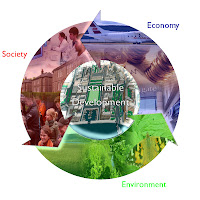
I currently work in the idea that there is no conflict between the concepts of sustainable development and economic growth, as some people suggest.
If we accepts that ‘Sustainable Development’ is a catchall term about intergenerational welfare, then optimal allocation of stock capital can support both sustainability and economic growth. In this case, stock capital includes both environmental capital (such as fossil fuel and clean water) and man-made capital (such as school and hospital).
If the above is accepted, then what is the difference between economic theories of maximisation of welfare and sustainable development? I try to answer these questions within a triad conceptual framework of economy, effectiveness and efficiency, and an spatial agent-based computational laboratory.
But what is 'sustainable development? WCED (1987) and UK Defra (2008) define sustainable development as “development that meets the needs of the present without compromising the ability of future generations to meet their own needs”. Although this definition seems clear, it does not provide a conceptual basis for measuring sustainable development in a systematic way (Beckerman 2003). For example the intra-generational needs of the people coevolve in space and time without necessarily satisfying all the present needs at any point in space and time.
Pezzey (1992) argues that sustainability is related with measures that sustain an improvement in the quality of life, which is also supported by Faucheux et al (1996) who emphasise the need for intergenerational equity in the context of non-negative change in economic welfare per capita. These definitions signal a shift in defining sustainability by promoting the concept of ‘welfare’ as an all-embracing central variable, as argued above. Beckerman (2003) argues since the whole problem is the selections of means towards ‘sustainability’ and the assessment of these means, then the concept of sustainable development has nothing to add (if not subtracting from the classical economic objective of maximisation of welfare because of the precautionary principle).
I try to critically analyze these premises within the ‘triad framework’ (economy, efficiency and effectiveness). Based on this triad framework, I propose ways to measure sustainable development in the context of urban economic growth using a spatial agent-based computational laboratory. I view this laboratory as step forward in addressing what the UK DOE (1996) argues: it is not clear what sustainable development means, thus it is difficult to know how to measure it or which policies promote it.


